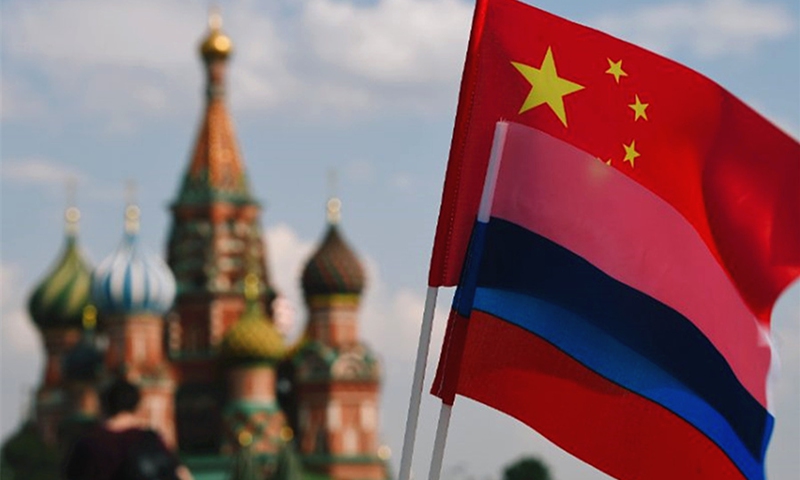
The national flags of China and Russia are seen on Red Square, Moscow.(Photo: Xinhua)
Editor's Note:
A recent joint Chicago Council on Global Affairs-Levada Analytical Center survey finds that the Russian public sees little downside to the growing bilateral relationship with China. According to the survey, three out of four Russians polled express a favorable view of China. Although some in the Russian political circles and public in the past years worried closer ties would lead to a heavy dependence on China, a majority of Russians (56 percent) polled say Moscow's active cooperation with Beijing is not increasing Russia's dependence on China. What have these figures indicated? Can China-Russia relationship be a model for major power relations? The Global Times interviewed a Russian expert to share his views.
Oleg Ivanov, Vice-Rector of Research, Moscow-based Diplomatic Academy
There may be various views of China and the West in Russia today. Some people are more Western-oriented than others. But over the past roughly 10 years after sanctions against Russia and pressure on our country, the number of such people diminished. Many Russians are offended by such attitude of the Western leaders. We look at China as a partner and can help each other overcome sanctions. We have a common position on many urgent issues especially in international security field. Our interdependency here is very important. We can ensure our security and prosperity if we work together. If we are separated we will make it possible for the West to impose its will on us. The West does not need powerful rivals that will cast doubt on its supremacy.
The West has adopted a confrontational strategy toward Russia for quite a long time. China also found itself under pressure from the West, mainly from the US. While Russia was regarded as a rival to the US' supremacy more in military terms, China was regarded as a rival mostly in economic terms. Under the administration of former US president Donald Trump, who took an intransigent attitude toward China, many believe that the China-US relations reached a new low.
The misunderstanding of the role that Russia and China played in world politics became the top agenda both in European capitals and in Washington. This pressure from the West toward Russia and China pulled the two countries together. Beijing and Moscow understood that they should unite their efforts to resist this pressure from the West. As a result of such cooperation, according to the survey mentioned above, since 2014, around 40 percent of Russians consider China as Russia's closest friend. This is more than the number for any other country.
However, some voices from the West think that China and Russia are only "friends with benefits." There is a close understanding between China and Russia, but its point is not of any material profit. The point is that both countries share a common position on what the world should be like, that is, a world moving toward multipolarity.
Multi-polarization is an objective process, and nobody can stop it. The common goal of China and Russia is to make this transition toward multipolarity smooth and without any conflicts. All the attempts to stop it or slow it down are considered as confrontational behaviors toward Beijing and Moscow.
Therefore, in order to guarantee the success of multi-polarization, regional and international security is now one of the priority areas of cooperation between China and Russia. This is demonstrated in multiple joint military exercises and two joint aerial patrols in the Asia-Pacific region.
Beijing and Moscow have quite a few more areas where they can cooperate. In economic terms, there is a connectivity between the Russia-led Eurasian Economic Union and the China-proposed Belt and Road Initiative, which has very good prospects to be realized between the two countries through Central Asia. It may give a good impetus to the economic and social development of China, Central Asian countries and Russia.
As close as China and Russia already are, the more pressure that comes from the West, the closer they will become. Facing suppressions from the West that keeps weaponizing certain issues, there are areas where Beijing and Moscow can cooperate even further. For example, China and Russia are accused by Western countries of violating human rights and democracy, which is denied by both countries. To stop the spread of disinformation, the two countries can join hands and work in close cooperation with international organizations, such as the United Nations, BRICS and Shanghai Cooperation Organization.
Moreover, the US also said that it faces cyberattacks from China and Russia, so cyberspace is another very important area where Russia and China can and should cooperate. There are still many potentials of cooperation in that area. Both Russia and China came up with an initiative to work out the international code of behavior in cyberspace. Unfortunately, the US and its allies rejected the joint proposal, leaving cyberspace open for attacks.
A closer relationship between China and Russia is not what the world does not want to see. Developing China-Russia relations are in favor of promoting multi-polarization and maintaining justice in the world. Multipolarity gives more chances to other countries to have a strong voice in international relations, and that is what both Beijing and Moscow applaud. Multipolarity will also create a more just world order. Under the new world order, there will be no more endeavors from Western countries to dominate the world, to impose their so-called democratic values on others and to arrange color revolutions, destabilizing the situation in other countries.
Can our relations be a model? Maybe a model is a word too strong to describe them. I would use the word "basis" on which many other countries can build their relations with their partners.




